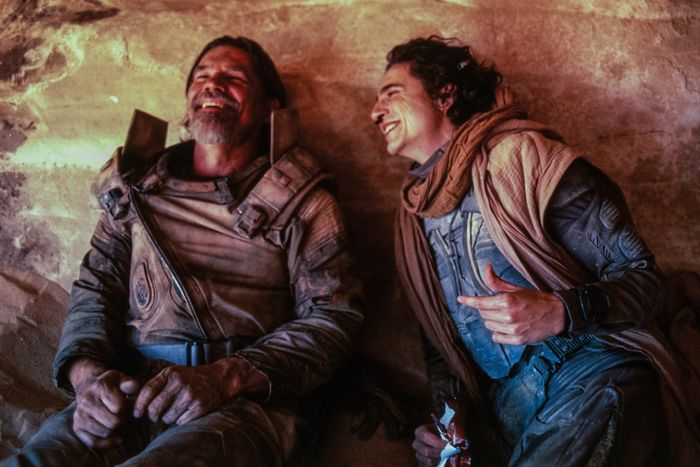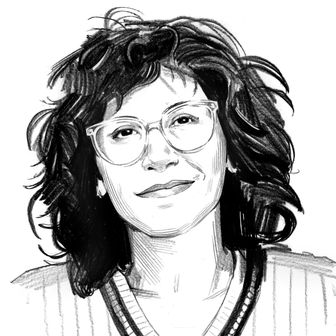
“It’s time to consume again,” Josh Brolin wrote on Instagram ahead of the Dune 2 premiere, “and experience that amazing feeling of when the lights go down, you have your hand deep in your Popcorn worm, and DUNE 2 consumes you.” Brolin’s Instagram captions, like his poetry in the new, behind-the-scenes book Dune: Exposures (which came out February 13 and became an Amazon best seller), project a playful enthusiasm for all that’s around him. Working in tandem with Dune cinematographer Greig Fraser, the two have combined Brolin’s words and Fraser’s behind-the-scenes photography to try and capture the ethereal and bizarre feeling that was all those months out in the desert and seeing Stellan Skarsgård in all those lumpy prosthetics as the Baron Harkonnen. (“Sleeping held at bay by our anticipation of what gem tomorrow holds” is paired with a photo of Skarsgård, glaring at the camera.) The poems are slippery, open-ended, and full of the actor’s now-signature affection for his co-stars and crewmates, or as Brolin himself puts it: “I was bowled over by my experience in the desert. I felt so incredibly insignificant, which became addictive.”
I wanted to start and talk about your relationship with Greig Fraser, with whom you worked on this book. We hear a lot about relationships between actors and directors, actors and other actors, but less so actors and directors of photography.
I’ve just always had a curiosity about the technicals of moviemaking. When you’re around people like Denis Villeneuve, and you’re around creative actors, actors who work hard and lovers of film and all that stuff, it just activates something. Everybody working at the top of their game, whether it’s Patrice Vermette doing the production design, or Greig or Jacqueline [West], it just gets me going. I like it; it makes me a little manic. It was producer Tanya Lapointe actually, who said, “I’ve read some of Josh’s stuff,” whatever bullshit stuff that I’d written on Instagram just literally which is another experimental platform I love. It’s great. Especially when you get people like, “What are you talking about? And why do you write so much? And can you please just post a picture and stop writing?”
I remember the night very well: It was toward what was to be the end of the movie, and Tanya said, “Why don’t you and Greig …?” [brings his hands together] because Denis had asked Greig to take photographs. I would have written all that stuff anyway, maybe not in that way, but all of that would have gone in journals anyway.
I wanted to ask about that writing process, if you’re writing longhand on set or reflecting back at the end of the day?
Well, I have kids. I had my family with me. I usually go to sleep two hours after they do, and then I’ll get up at 2:30 a.m., and then I’ll write until five.
Wow.
It’s not that I trained myself to do that. That’s just what happens. It’s the only time I get quiet. Ultimately, it’s less “who influenced you?” and “who this and that?” As a 56-year-old guy, it’s been more about accepting my own voice as opposed to copying someone else’s, and also complementing the pictures. I think this book presents itself like it’s not trying so hard. You get to make up your mind.
I love how there’s a back-and-forth between poems that leave a lot of white space on the page versus ones that feel a little bit more like prose poetry. When you’re writing, do you know the form going in or does that come later?
I love haikus here, which were never intended to be haikus. It felt like being too wordy or pedantic and all that with every single picture was too much. Don’t ruin the picture, don’t ruin the photograph. I was really happy with those actually, because I remember writing haikus in my 20s, and they were so bad because they were too influenced by somebody else, like Kerouac or whatever. Whereas this was 100 percent me and my experience in the desert. I was bowled over by my experience in the desert. I felt so incredibly insignificant, which became addictive. By the time we left, not only me, but my family and then the rest of the people on set, were very emotional leaving because you realize you’re a blip. You’re surrounded by these dunes forever changing shape, and you’re just so, so meaningless. It’s kind of great.
Do you think that the scope of the movie, working on a bigger production, allows for more time for you as an artist?
Yes, but not with this. The difference with Denis is he’s able to take on this massive scope, but never really lose the personal. It never doesn’t feel like my buddy who’s directing me, who I trust impeccably, even if he’s irritated, or even if I’m irritated. It always feels personal. There’s this little song that we do at the beginning of Dune: Part Two. Denis called me and he said, “Listen, I want you to write the lyrics. And I want Hans to do the music.” I’m like, “What?” I felt like he made a major mistake, but I was really happy with the lyrics. I spent a lot of time refining and sending to Hans, and Hans was vacationing at the time and would send me a picture of an iceberg or something and I’d be like, “Come on, man, I need your help.” Musically, it was genius. The lyrics I thought were very good.
In the Dune book series, your character Gurney is something of a poet and plays the lyre. You wrote one poem from Gurney’s point of view for your book, addressing Denis and asking for a song. How did writing from his point of view help inform what we see onscreen?
This poem was purely, selfishly Josh. Then when I actually wrote the song, I was like, “this informs so much about who this guy is.” Now, can we scrap both movies and go back to the beginning? I feel like I know a lot more about this guy because of the pressure I felt on a personal level after Denis said, “I need you to write the song that reintroduces this character.” There was more weight. What does this guy feel? Is he heartbroken? He’s lost these people that he was supposed to protect. He’s out in the desert. He’s lost all this weight, he’s angry, he’s grumpier, he’s somewhat of a criminal. It was also very informative writing the book during this time, as well as things I wrote afterwards, after we were home, and Greig and I were both in Los Angeles. It was nice to be able to revisit pictures and have a more romantic memory of what we had been through.
Is there any particular photo that comes to mind that served as a really inspiring point of access?
There were some photos of Stellan Skarsgård that were really poetically inspiring. What I wrote for that one was kind of tongue-in-cheek, what I imagined was going on in his head as an actor who’s been weighed down by 80 pounds of prosthetics, trying to stay in character, while you’re totally irritated and irritable. There’s also a photo of Rebecca Ferguson laying down, which to me was one of the greatest photos I’ve ever seen. Rebecca is laying down and Denis is kneeled down beside her. When you’re watching any of this Dune press, you see this fashion show going on. But I see this and all I see is vulnerability out in the middle of nowhere for weeks on end, with sand being blown in your face all day long.
A few of the poems highlight the generational gap between actors. What did you take away from working with a group of younger actors?
I love that there’s a poem that they exploited into the idea that I wanted to sleep with Timothée. [Laughs.] I’m like, “You fucking run with it.” The fact that I’ve been around for 40 years, and [Timothée] was somebody who was like a young basset hound when I first met him. He’s really an absolute raw nerve, and watching this trajectory of what he’s become, and what he’ll continue to become … Having known Zendaya and having known Timothée, and then being turned on to Florence Pugh and Austin Butler, who I’m absolutely in love with and have gotten really close with. I love how much they respect the work, and yet how much fun they have during the work. It’s a selfish thing. We have to be here for three months. I can’t look into a dark corner for three months. So there’s a lot of poking fun, and then you go into this place, and then you do your work, and then you come out and you have fun again. I found that really satisfying.
There’s a poem about watching everyone hanging out by the pool at one of the hotels you stay at in Jordan that ends with a description of Javier Bardem as a “Spanish gladiator.” What felt different about coming back together for this project after knowing each other for 13 years now?
Listen, man, I fall in love with people. I just do, I admit it. Javier, to me, is one of the most talented, sweetest, supportive, open, available human beings I’ve ever been around. I respect him on a personal and professional level. So that’s my love sentence to him. It’s nice when you write something where whatever’s inside me is the influence. It’s more about embracing who you are at this point. Just shut up and write it.


